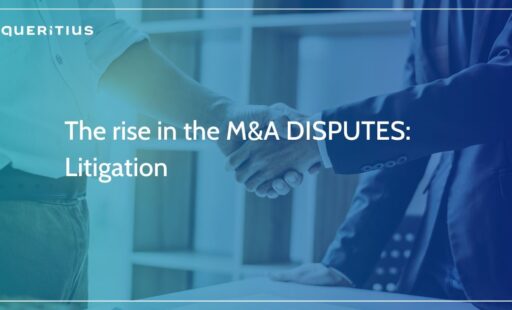The rise in M&A disputes and what to do about it: Litigation

14. 12. 2023
In our recent practice, Queritius has seen a steady rise in disputes arising from M&A transactions. In the last post of the series, we described the use of expert determination in such matters. We want to focus now on the pros and cons of litigating M&A claims in state courts.
The use of litigation strongly depends on the quality, speed, cost, and sophistication of the courts which the parties choose in the SPA for dispute resolution. Within the EU, Article 25 of Regulation 1215/2012 allows the parties to refer their disputes to a court or the courts of a Member State, to the exclusion of other courts.
There are some arguments why litigation could be preferred in M&A (mergers and acquisitions) disputes.
➡️ Every litigation involves at least two instances, and some parties may be comforted that if the court gets it wrong the first time, there is a chance to correct the error on the appeal. There may be certain aspects of the civil procedure rules in the chosen jurisdiction that favor either the plaintiff or the defendant. Further, to the extent the claim needs to be based not only on the SPA, but also on the statute (e.g. tort), or be brought against also non-parties to the SPA, there is no hassle as to whether an arbitration clause in the SPA is broad enough. If there are non-cooperative witnesses, they can be subpoenaed more easily to appear. And a state court is unlikely to request extensive document production from the parties.
However, there are arguments against the use of state courts, too. M&A disputes often involve complex accounting issues and standards that most judges are not familiar with. The civil procedure rules in most European countries will require courts to appoint their own experts, sometimes of dubious quality. The parties may be unable to rely on their own appointed experts. The procedure will often take years to complete, even in the first instance. And a damages valuation based on a DCF model or the determination of provisions based on ex ante assumptions may go well beyond the pale for many judges.
As a result, the choice of litigation for an M&A dispute may imply a final judgment which is rendered many years after the dispute arose and which need not address adequately the issues in dispute. For a seller waiting for its earn-out to be paid, for example, this is not an enviable scenario.
by Wojciech Sadowski
If you would like to read about the use of arbitration in M&A disputes, please watch the space for our next post in the series.
